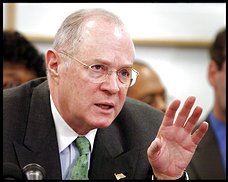The Court Takes on Redistricting, Kennedy Prodded off Fence
The Supreme Court will hear oral argument Wednesday in the Texas redistricting case. I think the case is still called Jackson v Perry, but I'm not certain. There are so many parties named that the final two party name of the case can change. The issue in this case is whether the 2003 redistricting plan enacted by Texas Republicans went too far. The new districting plan resulted in a six seat loss for Democrats in Congress. The Court has been struggling for decades to come up with a majority opinion in regard to political gerrymandering cases. They are notoriously troublesome.
While it will be important to see what Chief Justice Roberts and Justice Alito do with this case, I would argue that the focus is really on one justice. Watch this man.
Justice Anthony Kennedy will probably be the most important justice in this case.
Justice Kennedy did not want to shut off the possibility of a workable test to be applied in these cases. Unfortunately, the good justice could not come up with one himself. His opinion was basically, "There's no good test yet, I can't think of one, there might be one out there, make one up." Plaintiffs bringing these claims know that they must formulate a test that satisfies Justice Kennedy's burning desire for a usable test. He's the real legal hurdle that you need to jump.
While it will be important to see what Chief Justice Roberts and Justice Alito do with this case, I would argue that the focus is really on one justice. Watch this man.

Justice Anthony Kennedy will probably be the most important justice in this case.
Kennedy cast the swing vote in a 5-4 decision in 2004 that upheld Republican redistricting in Pennsylvania. But unlike other justices who made up a majority, he suggested some future claim against gerrymandering might have merit. "The assumption is that Justice Kennedy sees something in this case that he finds troubling," Charles said in an interview.The article is referring to the Vieth v Jubelirer case. This was a 5-4 case with Justice Kennedy providing the 5th vote in judgment. That means that he signed on to the result, but not the actual opinion. The plurality (not majority) opinion in Vieth is not binding precedent. Davis v Bandemer, a previous political gerrymandering case, didn't produce a majority opinion either. The plurality in Vieth (made up of Chief Justice Rehnquist, Justice Scalia, Justice Thomas, and Justice O'Connor) rejected the test put forth in Bandemer, saying that political gerrymandering was a political question that was not for the Court to decide.
Justice Kennedy did not want to shut off the possibility of a workable test to be applied in these cases. Unfortunately, the good justice could not come up with one himself. His opinion was basically, "There's no good test yet, I can't think of one, there might be one out there, make one up." Plaintiffs bringing these claims know that they must formulate a test that satisfies Justice Kennedy's burning desire for a usable test. He's the real legal hurdle that you need to jump.